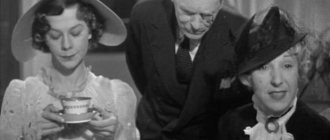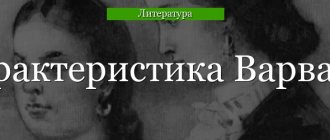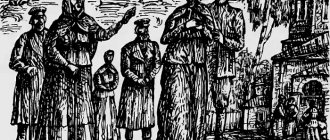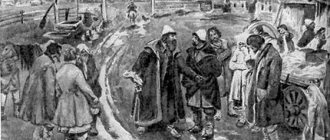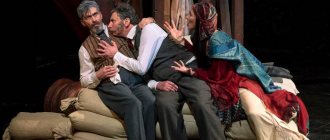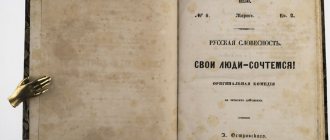Action 1
The conversation between Kudryash and Kuligin turned to nature. The opinions of the interlocutors were divided. Kuligin showed obvious delight at the colorful landscapes around him. Curly was indifferent to beauty. The conversation was interrupted by the cries of the Wild One. He again raised his nephew, not at all shy in his expressions. The topic of conversation changed. They began to discuss their family. Kudryash sided with Boris, believing that the guy had completely terrorized him.
Savel Prokofievich (Dikoy) joined the company. Boris's arrival was not a joy to him. He was clearly unhappy with the appearance of his nephew in the city. He already has his mouth full of worries, and now another parasite has appeared. As the conversation progressed, it became clear that Boris and his sister had no more relatives, except for their uncle.
The grandmother left a will to Boris, but you can receive it after coming of age from Dikiy. Provided that she can establish relations with him, but this is unlikely. Dikoy will always find a reason to find fault, no matter how hard you try.
Kuligin begins to reason that Boris will not see an inheritance. Dikoy is despotic. He won't be pleased. Boris's complaints about his difficult life were interrupted by the appearance of Feklusha, accompanied by a lady. She was delighted with the Kabanovs' house and its owners. Kuligin couldn’t stand Kabanikha, believing that she was a real tyrant in a skirt who had brought down all the household members.
Kuligin’s dream is to assemble a perpetual motion machine, but he has neither money nor opportunities. That kind of talent goes to waste. Boris feels sorry for him, but no less sorry for himself and his fate. He didn’t want to spend his youth in this wilderness. One thing is keeping him here. This is Katerina. He fell in love with her at first sight, but could not explain himself to the girl. She was married.
Kabanikha appears. Together with her are Katerina, Tikhon and Varvara. Tikhon got it to the fullest from his mother. She told him everything she thought about his wife and his attitude towards his mother, who undeservedly faded into the background after his marriage.
The boar went home. Tikhon attacked his wife with reproaches. A glass of vodka, kindly provided by Dikiy, helped relieve the tension.
Katerina pours out her soul to Varya. How good she lived with her parents and how terrible it is now. Life is not sweet. The heart senses trouble.
Varvara calms her down. As soon as Tikhon leaves, they will come up with something.
The Lady appears. Her words are terrible and pierce Katerina to the very heart. It seems to her that everything said is addressed to her. Varvara asks Katerina not to take the words of the crazy old woman to heart.
Tikhon returned for his wife. Married ladies are prohibited from walking alone.
Thunderstorm began.
Interaction with other characters
Of particular note is the episode of the conversation with Glasha, in which Feklusha tells the girl that all foreign religions are unrighteous, the court is dishonest, and non-Christian countries themselves are full of sin. This scene reflects an important character trait of the heroine: she thinks narrowly, considering only what she believes in to be true . At the same time, she inserts the truth about the residents of Kalinov between the lines in her crazy stories.
None of the interlocutors listens to this truth and does not want to accept it, because they have enough laudatory speeches about their native land and exciting stories of Feklushi.
After Glasha, Kabanikha becomes a victim of her tales. At first glance, it seemed that she had strong principles and could think for herself, but Feklusha did not have much difficulty in slowly leading her through her delirium with hypnotic speeches and eventually instilling in her that “fiery machines” were walking around the country, and people in the capital were in a hurry and fussing , so the end of the world is approaching.
These statements are illogical and have no justification, but Kabanova easily agrees with the wanderer, accepting the opinion that the world around her is collapsing.
The following qualities of a wanderer can be distinguished:
In addition, the author endowed his heroine with talkativeness.
Act 2
Katerina confesses to Varya that she is in love with Boris. Varvara understands her condition and asks her to calm down. She sees that the guy is not indifferent to the girl, but where should they meet? Katerina herself is afraid of her sinful thoughts. She has a husband, albeit an unloved one, but they are family. If life becomes a complete burden, it’s better to go headlong into the pool. Varvara promises to come up with something.
Tikhon is getting ready to go on the road. The mother gives instructions to her son about how his wife should behave during her departure. Tikhon repeats her words like a prayer. Everyone leaves. Katerina alone with Tikhon. She tearfully asks to take her with him. Tikhon is categorically against it. Falling to her knees, Katerina asks her to take an oath, but her husband remains adamant. He needs time to think. He wants to be alone.
Tikhon leaves. Kabanikha is dissatisfied that Katerina did not bow at her husband’s feet, as expected, seeing him off on a long journey. The indignant Kabanikha mutters under her breath that the youth have become completely insolent. Nothing is sacred to them.
Left alone, Katerina is sad that she has no children. The thoughts in the girl’s head are one sadder than the other. She convinces herself that she will wait for her husband. Varvara, as promised, decided to help Katerina organize a meeting with Boris.
Having replaced the key to the gate, she gives it to the girl. Katerina is confused, but takes the key. The desire to see your loved one is too strong.
Act 3
Kabanikha and Fyokla reflect on the rhythm of life. Both agree that Moscow is not for them.
Dikoy, having fairly taken it to his chest as he passed by, decided to stop and gossip with his neighbors. A skirmish ensued between him and Kabanikha. Realizing that he had gotten excited, Dikoy began to apologize, justifying himself by saying that in the morning he had been driven into a rage by the workers who demanded wages from him.
Boris misses Katerina. They haven't seen each other for a long time. Kuligin, as always, admires nature, but in the meantime manages to notice that only the rich live well at the expense of the poor, whom they rob.
Varvara and Kudryash, without hiding their feelings, kiss in front of everyone. After Kudryash leaves with Kuligin, she makes an appointment with Boris in the ravine, where she promised to bring Katerina.
Both Kudryash and Boris were at the meeting place. An argument begins between them. Nobody wants to give up their place on a date.
Boris admits that he is in love. Kudryash guesses who we are talking about.
Varvara leaves with Kudryash. Boris is waiting for Katerina. The girl comes on a date, but with reproaches that he ruined her honor. She is afraid to move on with her life. Boris suggests not filling your head with bad thoughts, but simply enjoying every day spent together. They confess their love to each other.
The lovers make an appointment for the next day.
Lesson summary on A. Ostrovsky's drama "The Thunderstorm" on the topic "Cruel morals of the city of Kalinov"
Literature lesson. Grade 10. “Cruel morals, sir, in our city...” (based on A. Ostrovsky’s drama “The Thunderstorm”
We enter the city of Kalinov from the side of the public garden. Let's pause for a minute and look at the Volga, on the banks of which there is a garden. Beautiful! Eye-catching! So Kuligin also says: “The view is extraordinary! Beauty! The soul rejoices!” People probably live here peaceful, calm, measured and kind. Is it so? How is the city of Kalinov shown?
Work on two monologues by Kuligin (act 1, scene 3; act 3, scene 3).
- Highlight the words that especially vividly characterize life in the city.
"Cruel morals"; “rudeness and naked poverty”; “You can never earn more than your daily bread through honest work”; “trying to enslave the poor”; “to make even more money from free labor”; “I won’t pay a penny extra”; “trade is undermined out of envy”; “they are at enmity”, etc. - these are the principles of life in the city.
- Highlight the words that especially vividly characterize family life.
“They made the boulevard, but they don’t walk”; “the gates are locked and the dogs are unleashed”; “so that people don’t see how they eat their own family and tyrannize their family”; “tears flow behind these constipations, invisible and inaudible”; “behind these castles there is dark debauchery and drunkenness,” etc. - these are the principles of family life.
If it’s so bad in Kalinov, then why is there a wonderful view at the beginning, the Volga, the same beautiful nature in the scene of the meeting between Katerina and Boris?
Conclusion. The city of Kalinov is contradictory. On the one hand, there is a wonderful place where the city is located. On the other hand, life in this city is terrible. The beauty is that it does not depend on the owners of the city; they cannot subjugate nature.
Issues for discussion:
- How can you evaluate Feklusha’s monologues (act 1, scene 2; act 3, scene 1)? How does the city appear in her perception? ( Bla-alepye, wondrous beauty, promised land, paradise and silence
). - What technique does the author use when talking about life in the city? ( Contrast
). - What are the people like who live here? ( They believe Feklusha’s stories, which show her darkness and ignorance: a story about a fiery serpent; about someone with a black face; about time that is becoming shorter - act 3, yavl. 1; about other countries - act 2, yavl. 1. They are afraid of thunderstorms - Act 4, Rev. 4. They believe that Lithuania fell from the sky - Act 4, Rev. 1.)
- How is it different from the residents of the city of Kuligin? ( An educated person, a self-taught mechanic - the surname resembles the surname Kulibin. Feels the beauty of nature. Aesthetically stands above other heroes: he sings songs, quotes Lomonosov. He advocates for the improvement of the city, tries to persuade Dikiy to give money for a sundial, for a lightning rod. Tries to influence the residents , enlighten them, explaining the thunderstorm as a natural phenomenon. Thus, Kuligin personifies the best part of the city's inhabitants, but he is alone in his aspirations, so he is considered an eccentric. The eternal motive is grief from the mind.
) - Who can we consider “masters of the city”? How do these heroes appear on stage? ( Prepared appearance - first others talk about them, and then they take the stage themselves
). - Who prepares their appearance? ( Kudryash introduces Dikiy, Feklush introduces Kabanikha
).
Dikoya and Kabanikha are the “masters” of the “dark kingdom”. The main method of revealing their characters is speech characterization. You should pay attention to the analysis of their main remarks:
Wild:
Kabanikha:
About him:
"scolder"; “It’s like he’s broken loose.”
About her:
“all under the guise of piety”; “a prude, he lavishes on the poor, but completely eats up his family”; "swears"; “sharpenes iron like rust.”
Himself:
"parasite"; "damn"; “you failed”; "foolish man"; “go away”; “What am I to you - equal or something”; “he’s the one who starts talking to the snout”; robber"; "asp"; "fool" etc.
She herself:
“I see that you want freedom”; “He won’t be afraid of you, and even less so of me”; “you want to live by your own will”; "fool"; “order your wife”; “must do what the mother says”; “where the will leads”, etc.
Conclusion. Dikoy is a scolder, a rude person, he feels his power over people, a tyrant.
Conclusion. Kabanikha is a hypocrite, does not tolerate will and insubordination, and acts out of fear.
General conclusion: Kabanikha is worse than Wild, because her behavior is hypocritical. Dikoy is a scolder, a tyrant, but all his actions are open. Kabanikha, hiding behind religion and concern for others, suppresses the will. Her biggest fear is that someone will live by their own will.
The results of the actions of these heroes:
- The talented Kuligin is considered an eccentric and says: “There is nothing to do, we must submit!”
- The kind, but weak-willed Tikhon drinks and dreams of breaking out of the house: “... and with this kind of bondage you will run away from whatever beautiful wife you want.” He is completely subordinate to his mother.
- Varvara adapted to this world and began to deceive: “And I wasn’t a deceiver before, but I learned when it became necessary.”
- Educated Boris is forced to adapt to the tyranny of the Wild in order to receive an inheritance.
This is how he “breaks” the “dark kingdom” of good people, forcing them to endure and remain silent.
Act 4
Rain cats and dogs. People have to hide from the downpour in a gallery on the walls of which hang paintings depicting the Last Judgment.
Kuligin asks to borrow money from Dikiy. It caught fire with a lightning rod device. Dikoy refuses him, calling him an atheist.
Kuligin leaves, but promises to return and put an end to the conversation when he has at least a million dollars rustling in his pocket. The storm has died down.
Tikhon unexpectedly returns home. He doesn't like his wife's behavior. Katerina is not herself. The boar adds fuel to the fire. The thunderstorm reminded itself again.
Kuligin with Kabanikha, Katerina and Tikhon leave the house. The thunderstorm scared the girl. She believes that God is punishing her for her sins. Seeing Boris, she became even more scared. People in the crowd whisper that a thunderstorm never happens for nothing. Katerina is almost sure that a lightning bolt will kill her. The girl begins to pray in a whisper.
Kuligin, unlike others, rejoices in the thunderstorm. He imagines how a grass, a tree, a flower will come to life. The lady, accompanied by footmen, approached Katerina. She shouts at her not to hide. It won't help. It’s better to ask God to take away beauty. The only way to atone for sins.
Katerina, in a fit of frenzy, tells her husband and mother-in-law about her relationship with Boris.
The Role of the Wanderer
The fundamental role of Feklushi is that of the blessed wanderer. This is exactly how the characters perceive her. The image of a wanderer is widespread and popular in Russian folklore and works of authorship, so it is not difficult to imagine Feklusha’s appearance, although Ostrovsky did not mention this detail in the text. Traits of wanderers in literature:
The name of the heroine is the next detail that speaks about her image. The diminutive form indicates the infantility and level of mental development of Feklushi.
